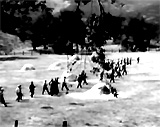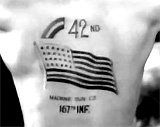
|
Hell's Highway (1932)
In director Rowland Brown's hard-hitting indictment
of the sadistic prison chain-gang system (the first of its kind in
the film industry), by RKO's David Selznick, similar to Warners'
soon-to-be-released I Am A Fugitive From a
Chain Gang (1932) - about prisoners employed to construct "Liberty
Road County Highway" for unscrupulous private contractor William
Billings (Oscar Apfel) on a tight budget and timeline:
- the opening credits sequence (with a chorus sung
by Frieta Shaw's Etude Ethiopian Chorus) - a montage of newspaper
headlines detailing the cruel atrocities of a prison 'death camp'
inflicted upon various inmates; a prologue stated: "Dedicated
to an early end of the conditions portrayed herein - which, though
a throwback to the Middle Ages, actually exist today."
- the sequence continued with the chained-up prisoners
roused from their bunks to wash and prepare for their grueling
day of labor on the "Liberty Highway" - all prisoners
had targets on the backs of their jumpsuits
- the introduction of the heroic character of 'forgotten
man' prisoner Frank 'Duke' Ellis (Richard Dix), a tough con and repeat
offender

|

|

|
|
Targets on Prisoner Jumpsuits
|
Carter's Sweat-Box Death-Suicide
|
Inmate Protest Led by Duke
|
- the early scene of the torture and death of hapless
young prisoner Joe Carter (John Arledge), who paused during the
harsh workday (to look down at his blistered hands) and was punished
by being taken to "the hospital" (prison-speak for a
coffin-shaped sweatbox composed of sheet metal) where he committed
suicide by self-strangulation (on the chain strapped around his
neck to help hold him in place); the word of his death spread fast:
("Carter's dead. Strangled to death in the sweat box. The
contractor says the boy committed suicide")
- the resultant angry protest by fellow prisoners about
Carter's death before a meal, when they passed along the news ("Carter's
dead"), and Duke complained about not having spoons to eat when
lined up in the mess hall at tables facing bowls of soup
- the scene of Duke saving his younger brother Johnny
Ellis (Tom Brown) from being incarcerated in the sweatbox, in exchange
for agreeing to get the other prisoners to cooperate and complete
the road project
- the whipping-punishment scene of Duke, whose military
tattoo on his back caused the guard to pause in mid-air
- the masterminding and execution of a major prison-break,
fire and riot, causing retaliation and a massive search party of
men with guns - who were promised: "You'll get $50 dollars a
head for every convict you bring back"; after freeing several
guards from the fire before escaping himself, Johnny was shot and
wounded by a search team, then found by Duke, and carried back to
the camp; instead of both brothers being charged wth murder and as
ringleaders of the escape attempt, Johnny was vindicated for saving
the guards ("Why this boy saved every guard in camp from being
burned to death!")

|

|

|
|
Search Party After Prison Break
|
Johnny Shot and Wounded
|
Duke's Rescue of Johnny - Carried Back to Camp
|
- in the conclusion, after Johnny was taken to the
hospital, the governor informed Billings that he was under arrest
for Carter's murder and was responsible for the inhumane sweatbox: "When
I think of what's happened here ... It's going to affect your treatment
of the human beings in the state...It wouldn't have happened if
you hadn't driven the men into it. This finishes you, Billings...this
looks as if you have to answer for the death of that Carter boy"
- and Duke was called to testify as a witness against him (Duke to
Billings: "You always wanted me to turn stool-pigeon, Billings.
I never knew what a pleasure it could be until now")
|

The Liberty Road

Prisoners Chained In Their Bunks

Frank 'Duke' Ellis
(Richard Dix)

Duke Saving Younger Brother Johnny


Duke's Whipping - and Display of His Military Tattoo

Ending: The Governor (on left) Charged Road-Building Contractor
Billings With the Murder of Carter
|








